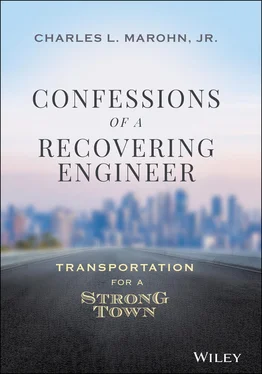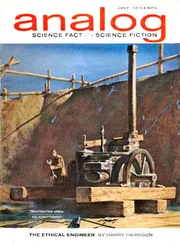“No, I'm not.” I tried not to roll my eyes or sound like the teenager I was just a few years earlier .
“I am not even aware of any accidents that have occurred on this street. Are you aware of any accidents?”
I repeated, “No, I'm not.”
“Then why do you say that the street is not safe today?”
One of the frequent justifications for making roadway improvements is a tragic incident, especially a death. While those cases often seem random, they form a powerful justification for doing an improvement project, especially where you can tap into available federal or state funding. Multiple incidences can even create a sense of urgency. Since there is a seemingly endless list of roads that need improvement, prioritizing by death rate or accident rate can almost seem natural.
That wasn't the case here. We were proactively making the improvements to this street to make it safer — to bring it up to an acceptable standard in a way that would ultimately save lives. We weren't waiting for the accident rate to rise; we were getting out in front of that. It gave me a feeling of satisfaction in my work.
“The street is not safe because it does not meet the standard.”
“So, today cars drive slowly and it is safe, but you want to flatten the street, straighten the street, widen the street, and remove all of the trees so that cars can drive fast? Only afterwards will you post a speed limit so that cars will slow down? And you say this is safer?”
It was a clever recitation, but while the woman with whom I was speaking was clearly sharp-witted, she lacked the background knowledge and understanding that allowed her to grasp the situation fully. I would try one last time to enlighten her.
“Yes, it will meet the standard. And please understand that there are high traffic projections for this street.”
“What do you mean by a high traffic projection?”
“We project that a lot of cars will use this street in the coming years.”
We've all been on roads that lacked capacity, where the traffic was at a standstill. From the perspective of the traffic engineer, this is an absolute failure. We even give it a grade of F.
Traffic engineers use a scale to measure “level of service” that runs from A, for “free flow condition” where all traffic is moving unhindered, to F, where the flow of traffic breaks down and travel times are unpredictable.
Cities spend a great deal of time and resources analyzing and projecting traffic patterns. For this project, our models suggested a large increase in traffic, something that would create congestion and reduce traffic flow to Level of Service D — or potentially worse. All of the improvements underway were a proactive attempt to avoid bottlenecks and keep traffic flowing. We were being proactive with this project and I was proud of that.
“Why would a lot of cars drive down this street? It is a small, narrow street where you have to drive slow.”
Now we were getting somewhere. Now she was asking the right questions — the ones that explained exactly why this project was so important. And I could surely sympathize with her not understanding what was coming. She hadn't seen the models my colleagues and I had put together. She wasn't the expert working with this every day. I felt a renewed sense of optimism. We were making progress. I replied excitedly.
“That is why we have to improve the street — to meet the standard.”
She gave me a sideways glance. “Won't that just encourage more people to drive?”
“We have anticipated that, and we are adding two more lanes to handle the additional cars.”
That insight was not received in the way that I anticipated. There was an uncomfortable period of silence — the kind where the person expected to speak is too startled to do so. Her eyes widened and she stared at me, not blinking.
“You are adding two more lanes?”
“Yes.” I was nodding knowingly .
“For cars?”
“Yes. An additional two lanes will allow the street to meet the standard.”
I looked down at my feet. I wasn't sure how to react to this conversation. It was clear that the woman with whom I was speaking was upset, but certainly she didn't want traffic congestion in front of her home. I bet she'd be the first one calling City Hall if she was stuck in traffic every day at Level of Service F.
I just needed to help her understand what was already so clear to me. Yes, she might have to give up some trees and a little bit of her front yard, but didn't she want things to be safe? Didn't she want the road to work for everyone? She spoke next.
“Let me see if I understand. You are projecting a high volume of traffic where there is none today and then building a street to handle this traffic. Aren't you just encouraging more people to drive?”
“No. We are anticipating a lot of growth and need to make this improvement to handle the growth.”
While I'm an engineer, I'm really in the growth business. All of us who work for the city are in the growth business in one way or another. New growth is how we get the money we need to fix the streets, pay for police officers and fire fighters, keep the library open, and all of the other things that taxpayers say they want. Growth is how people get jobs. It's the unifying focus that we more or less all seem to agree on.
The more growth that we can generate, the better off things are for everyone. Yes, there are some people who are anti-growth. They sometimes come to council meetings with a sentimental attachment to some old building, a concern over an environmental issue, or maybe expressing their concern with economic dislocation. There are generally a few speaking out against each project, but they usually aren't taken very seriously. What are we supposed to do? Stop growing? That would be a disaster.
She asked, “Where is all of this growth happening?”
“New growth is being created in the tax subsidy zone.”
“Where is the tax subsidy zone?”
“The tax subsidy zone is on the edge of town.”
In a recent planning process with the city, my colleagues and I identified many sites where infrastructure could be extended. These are places primed for growth, where public spending can be a catalyst for quick private investment. All of the major developers and business leaders were at these meetings, and they were enthusiastic for that kind of public support. That makes sense because they know what it takes to create growth.
To their credit, the city leadership followed through. They took on a lot of debt to invest in additional capacity. They applied for economic development grants from the federal and state governments. They waived fees and other development charges, and they streamlined the approval processes. Even more proactively, they established some tax subsidy areas, a move that had paid off with an initial round of development proposals. It was all very exciting.
“What kind of new growth is going to occur in the tax subsidy zone?”
“On the edge of town, there is a proposal for a grocery store as well as a drive-through restaurant and a gas station.”
“Okay. But I go to the neighborhood grocery store across the street, I eat at the restaurant up the block, and I don't drive much, so I don't need another gas station.”
I had heard this kind of thing before, but what she referred to as a “grocery store” was just a small neighborhood grocery. You couldn't get much there, nothing like the big box store that my family bought groceries from, not to mention all of the families I knew.
Читать дальше












